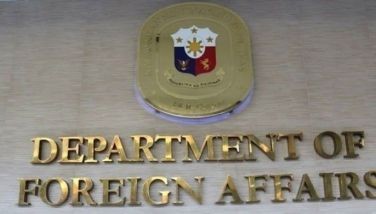Serge seeks higher excise tax on AUVs
June 4, 2003 | 12:00am
Sen. Sergio Osmeña III is seeking a higher excise tax on most Asian Utility Vehicles (AUVs).
In a proposal that he has submitted to the Senate ways and means committee, Osmeña wants that AUVs priced at P600,000 and below continue to enjoy an excise tax exemption.
However, he is suggesting that the bulk of the AUVs — those selling for between P600,000 and P1 million — be taxed up to 13 percent.
Under the excise tax rationalization bill that ways and means committee chairman Sen. Ralph Recto is sponsoring, AUVs in the price range of P500,000 and below would have a tax of three percent, while those in the P500,000-P1 million bracket would have a rate of nine percent.
The bill would have the tax levied based on values or prices instead of seating capacity or engine displacement. The tax would be based on the net manufacturer’s price.
In proposing that AUVs costing no more than P600,000 continue to be excise tax-exempt, Osmeña apparently wants makers of the so-called poor man’s vehicle to lower their selling prices.
At present, 92 percent of AUVs are in the P500,000-P1 million price range. Sales data submitted by carmakers to Recto’s committee showed that 38,442 of the 41,725 units of AUV sold last year were in this bracket. Only 3,283 sold for P500,000 and below.
With the classification of its CRV as a 10-seater, Honda Cars Phils. sold the highest number of high-priced AUV in 2002 – 5,254 units of CRV (automatic transmission). Isuzu was second, having disposed of 3,461 units of its XUV (manual transmission).
If the AUVs are grouped in the P600,000 and below and P600,000-P1 million brackets, most of these vehicles would still fall in the higher-end category.
Other excise tax rates suggested by Osmeña: 43 percent for vehicles selling for P1 million to P1.5 million, 66 percent for those priced at P1.5 million to P2 million, 90 percent for those in the P2 million-P2.5 million range, and 100 percent for those costing at least P2.5 million.
Under the Recto-sponsored bill, the highest tax would be 40 percent.
The Senate is trying to approve the measure before Congress adjourns its second regular session this weekend. — Jess Diaz
In a proposal that he has submitted to the Senate ways and means committee, Osmeña wants that AUVs priced at P600,000 and below continue to enjoy an excise tax exemption.
However, he is suggesting that the bulk of the AUVs — those selling for between P600,000 and P1 million — be taxed up to 13 percent.
Under the excise tax rationalization bill that ways and means committee chairman Sen. Ralph Recto is sponsoring, AUVs in the price range of P500,000 and below would have a tax of three percent, while those in the P500,000-P1 million bracket would have a rate of nine percent.
The bill would have the tax levied based on values or prices instead of seating capacity or engine displacement. The tax would be based on the net manufacturer’s price.
In proposing that AUVs costing no more than P600,000 continue to be excise tax-exempt, Osmeña apparently wants makers of the so-called poor man’s vehicle to lower their selling prices.
At present, 92 percent of AUVs are in the P500,000-P1 million price range. Sales data submitted by carmakers to Recto’s committee showed that 38,442 of the 41,725 units of AUV sold last year were in this bracket. Only 3,283 sold for P500,000 and below.
With the classification of its CRV as a 10-seater, Honda Cars Phils. sold the highest number of high-priced AUV in 2002 – 5,254 units of CRV (automatic transmission). Isuzu was second, having disposed of 3,461 units of its XUV (manual transmission).
If the AUVs are grouped in the P600,000 and below and P600,000-P1 million brackets, most of these vehicles would still fall in the higher-end category.
Other excise tax rates suggested by Osmeña: 43 percent for vehicles selling for P1 million to P1.5 million, 66 percent for those priced at P1.5 million to P2 million, 90 percent for those in the P2 million-P2.5 million range, and 100 percent for those costing at least P2.5 million.
Under the Recto-sponsored bill, the highest tax would be 40 percent.
The Senate is trying to approve the measure before Congress adjourns its second regular session this weekend. — Jess Diaz
BrandSpace Articles
<
>
- Latest
- Trending
Trending
Latest
Trending
Latest
Recommended































